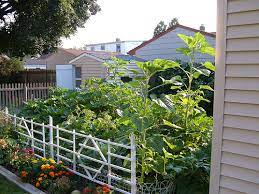The Benefits of Sustainable Gardening
Sustainable gardening is a practice that focuses on creating and maintaining a garden in an environmentally friendly and resource-efficient manner. By implementing sustainable gardening techniques, individuals can reduce their environmental impact while enjoying a beautiful and productive garden.
Key Principles of Sustainable Gardening
- Water Conservation: Sustainable gardening emphasizes the importance of water conservation through practices such as mulching, rainwater harvesting, and drip irrigation.
- Soil Health: Building healthy soil through composting, crop rotation, and minimal tillage is essential for sustainable gardening.
- Biodiversity: Encouraging biodiversity in the garden by planting a variety of native plants helps support pollinators and beneficial insects.
- Chemical-Free Practices: Avoiding synthetic pesticides and fertilizers in favor of organic alternatives promotes a healthier ecosystem in the garden.
Benefits of Sustainable Gardening
Environmental Protection: By reducing water usage, minimizing chemical inputs, and supporting biodiversity, sustainable gardening helps protect the environment and promote ecosystem health.
Resource Efficiency: Sustainable gardening practices help maximize the use of resources such as water, soil nutrients, and sunlight, leading to more efficient garden management.
Fresh Produce: Growing your own fruits, vegetables, and herbs using sustainable methods ensures a fresh and nutritious food supply right from your backyard.
Aesthetic Appeal: Sustainable gardens are not only functional but also visually appealing, creating a harmonious blend of beauty and eco-friendliness.
In conclusion, sustainable gardening offers numerous benefits for both individuals and the environment. By adopting eco-friendly practices in your garden, you can contribute to a healthier planet while enjoying the rewards of a thriving and sustainable outdoor space.
Top FAQs on Sustainable Gardening: Best Plants, Benefits, Terminology, and Tips for Improvement
- What plants are best for a sustainable garden?
- What are the benefits of sustainable gardening?
- What is the name for sustainable gardening?
- How can we make gardens more sustainable?
What plants are best for a sustainable garden?
When considering the best plants for a sustainable garden, prioritizing native species is key. Native plants are well-adapted to the local environment, requiring less water, fertilizer, and pesticides compared to non-native species. Additionally, selecting plants that support local wildlife, such as pollinators and beneficial insects, contributes to the overall biodiversity and health of the garden ecosystem. Incorporating perennial plants that require minimal maintenance and provide long-term benefits is also advantageous for a sustainable garden. By choosing a diverse array of native, wildlife-friendly, and low-maintenance plants, gardeners can create a thriving and environmentally conscious landscape that aligns with sustainable gardening principles.
What are the benefits of sustainable gardening?
The benefits of sustainable gardening are manifold, encompassing environmental, social, and personal advantages. Sustainable gardening promotes conservation of resources such as water and soil, reduces reliance on synthetic chemicals, fosters biodiversity, and supports pollinators. By implementing eco-friendly practices like composting, mulching, and organic pest control, sustainable gardening contributes to healthier ecosystems and protects the environment. Additionally, sustainable gardening encourages local food production, enhances community resilience, and provides a rewarding opportunity for individuals to connect with nature while enjoying fresh, homegrown produce. Overall, the benefits of sustainable gardening extend beyond the garden itself to positively impact both individuals and the planet as a whole.
What is the name for sustainable gardening?
The practice of sustainable gardening is often referred to as “permaculture.” Permaculture encompasses a holistic approach to gardening and land management that focuses on creating sustainable and self-sufficient ecosystems. By integrating principles of care for the earth, care for people, and fair share, permaculture aims to design regenerative systems that work in harmony with nature. Through techniques such as water conservation, soil building, biodiversity promotion, and organic practices, permaculture offers a comprehensive framework for creating resilient and productive gardens while minimizing environmental impact.
How can we make gardens more sustainable?
To make gardens more sustainable, it is essential to implement a combination of eco-friendly practices that focus on conserving resources, promoting biodiversity, and reducing environmental impact. Some key strategies include using organic fertilizers and natural pest control methods to avoid harmful chemicals, practicing water conservation through techniques like mulching and rainwater harvesting, planting native species to support local wildlife and pollinators, composting organic waste to enrich the soil, and incorporating permaculture principles for a holistic approach to garden design and management. By adopting these sustainable gardening practices, individuals can create thriving gardens that are not only beautiful but also environmentally responsible.

